|
|
|
Sort Order |
|
|
|
Items / Page
|
|
|
|
|
|
|
| Srl | Item |
| 1 |
ID:
179944
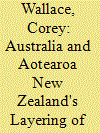

|
|
|
|
|
| Summary/Abstract |
Around 2016, the Australian and Aotearoa New Zealand governments began to disassemble the coherent and optimistic imagery that had hitherto signaled their strategic commitment to accommodating China within an interdependent, prosperous, and strategically stable Asia-Pacific. While Canberra and Wellington remain committed to constructive "bedrock" bilateral relations and still avoid explicitly positioning China as a direct threat in their strategic messaging, both governments have increasingly communicated (1) concerns about their strategic vulnerability and military insecurity that requires enhanced military potency; (2) pessimism that great power competition could disrupt Asia-Pacific stability, requiring strategic diversification and cross-bracing with "Indo-Pacific" partners; and (3) stronger official criticism on narrower, strategically circumscribed issue sets as the two nations attempt to set acceptable terms for anticipated relations of greater future complexity with China. The targets of this "layered" approach to strategic communications are not only Beijing and Washington, DC, but increasingly other important regional partners and domestic stakeholder audiences with diverse interests.
|
|
|
|
|
|
|
|
|
|
|
|
|
|
|
|
| 2 |
ID:
075788
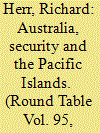

|
|
|
|
|
| Publication |
2006.
|
| Summary/Abstract |
While Australia did not single-handedly scuttle the prospects of a more tightly knit Commonwealth arrangement in the Pacific Islands, its security ambitions have worked against the development of such ties. This article identifies three key turning points, beginning from 1944, where Australia opted for alliance arrangements that undermined closer Commonwealth ties with and among the Pacific Islands. As the region's hegemonic influence, Australia's decisions have been a significant factor in shaping the contemporary Pacific Islands regional system. Canberra's active commitment and backing would have been essential for closer Commonwealth connections to be developed in this varied and remote region. Yet Australia's search for security in the Southwest Pacific has denied the Commonwealth the benefit of such unqualified support. Commonwealth ties are still a factor within the Pacific Islands region in such areas as contemporary political relationships, including the maintenance of Westminster traditions, but they are probably not what they might have been.
|
|
|
|
|
|
|
|
|
|
|
|
|
|
|
|
| 3 |
ID:
086625
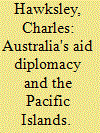

|
|
|
|
|
| Publication |
2009.
|
| Summary/Abstract |
Great powers seek to influence world affairs; middle powers seek to influence their regions. Australia's 'near abroad' includes Indonesia and the South Pacific, especially Melanesia. Elected Prime Minister in November 2007, Kevin Rudd has indicated a new direction for Australian policy in the Pacific and the previous image of a pushy or bullying Australia has to some extent been laid to rest. Yet the key differences between Rudd's policies and those of the former government of John Howard appear to be of style rather than substance. Despite the new rhetoric of greater engagement, the emphasis on market forces creating development shows an essential continuity of Australian foreign aid policy in the South Pacific.
|
|
|
|
|
|
|
|
|
|
|
|
|
|
|
|
| 4 |
ID:
069186
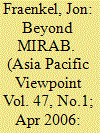

|
|
|
| 5 |
ID:
103956
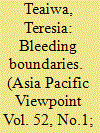

|
|
|
|
|
| Publication |
2011.
|
| Summary/Abstract |
This introduction to an Asia Pacific Viewpoint special section on militarism and gender in the Pacific argues that gendered analyses are crucial to understanding processes of militarization, and that multidisciplinary and interdisciplinary approaches are integral in that effort. The introduction also provides background to the articles, outlining their origin in a workshop on militarism and gender in the Pacific held in Wellington, New Zealand in 2009, and its subsequent iteration in sessions at the Oceanic Conference of International Studies in 2010. The special section constitutes the first publication of a permanent working group on militarism and gender in the Pacific with an international, multidisciplinary membership.
|
|
|
|
|
|
|
|
|
|
|
|
|
|
|
|
| 6 |
ID:
116765
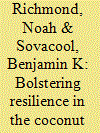

|
|
|
|
|
| Publication |
2012.
|
| Summary/Abstract |
This communication discusses climate change adaptation efforts underway in Vanuatu. In particular, it uncovers why community-based approaches to adaptation are more likely to bear fruit than ones driven from the top-down at the national level. The authors make this claim based on early evidence that small-scale projects (a) support community ownership over adaptation, (b) provide ongoing technical learning lessons (c) relieve pressure from capacity constraints at national administrative bodies, and (d) expedite implementation by avoiding cumbersome multilateral procedures. The first section discusses its research methods and presents important characteristics of the Vanuatu economy, people and geography. The communication then moves on to discuss Vanuatu's vulnerability to the effects of climate change. It specifically investigates on-going efforts to adapt to natural climatic hazards in Vanuatu. Early evidence and analysis reveals lessons salient for energy and climate policy.
|
|
|
|
|
|
|
|
|
|
|
|
|
|
|
|
| 7 |
ID:
179811


|
|
|
|
|
| Summary/Abstract |
One of President Joseph Biden's foreign policy priorities is to ‘renew’ and ‘strengthen’ the United States' alliances, as they were perceived to have been ‘undermined’ during the Trump administration, which regularly expressed concern that allies were free-riding on the United States' military capability. Yet the broad range of threats states face in the contemporary context suggests that security assistance from allies no longer only—or even primarily—comes in the form of military capability. We consider whether there is a need to rethink understandings of how alliance relationships are managed, particularly how the goals—or strategic burdens—of alliances are understood, how allies contribute to those burdens, and how influence is exercised within alliances. We do this by analysing how the United States–Australia and Australia–New Zealand alliances operate in the Pacific islands. Our focus on the Pacific islands reflects the United States' perception that the region plays a ‘critical’ role in helping to ‘preserve a free and open Indo-Pacific region’. We conclude that these understandings need to be rethought, particularly in the Pacific islands, where meeting non-traditional security challenges such as economic, social and environmental issues, is important to advancing the United States, Australia and New Zealand's shared strategic goal of remaining the region's primary security partners and ensuring that no power hostile to their interests establishes a strategic foothold.
|
|
|
|
|
|
|
|
|
|
|
|
|
|
|
|
| 8 |
ID:
125040


|
|
|
|
|
| Publication |
2013.
|
| Summary/Abstract |
Despite its relative absence from much of the literature on politics in the Pacific region, religiosity is an assumed and often unchallenged component of political life. Drawing from more than 100 in-depth biographical interviews with politicians, around 40 published life histories and other publicly available material, this article uses Pierre Bourdieu's concept of 'habitus' to explore how politicians see the role of faith and religious association contributing to their public profile, election campaigning, representative and legislative functions, and 'inner' life. It advances two arguments: firstly, that ideal analytic distinctions like state, society and religion become problematic in the Pacific Islands where political leaders tend to occupy multiple roles and assume overlapping identities; and, secondly, that despite the overwhelming religiosity seemingly apparent in public rhetoric, secularization is an effervescent narrative across the region with politicians vocal protagonists on all sides of this debate.
|
|
|
|
|
|
|
|
|
|
|
|
|
|
|
|
| 9 |
ID:
129344
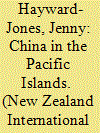

|
|
|
| 10 |
ID:
187474
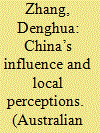

|
|
|
|
|
| Summary/Abstract |
Traditional powers have growing concerns about China’s influence in the Global South derived from its fast-growing outreach in the past two decades. However, how stakeholders in developing countries perceive China’s engagement and influence remains largely unknown. Drawing upon a survey of 210 participants and 30 follow-up interviews in the Pacific region with a focus on Papua New Guinea, Fiji and Tonga, this paper examines Pacific civil society stakeholders’ perceptions about China. It suggests that these perceptions are nuanced at best and reveals concerns about the Belt and Road Initiative, Chinese foreign aid and China-Pacific relations. It argues that China’s influence on Pacific civil society is weak, but this may be different in the political, government and business sectors. More similar research is required to develop a comprehensive understanding.
|
|
|
|
|
|
|
|
|
|
|
|
|
|
|
|
| 11 |
ID:
120199
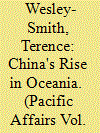

|
|
|
|
|
| Publication |
2013.
|
| Summary/Abstract |
This paper identifies a broad context for assessing China's increased interest in the Pacific Islands, and examines some of the major implications for regional security, regional politics, western influence, and self determination in the region. It argues that Beijing's policy towards the Pacific is not driven by strategic competition with the United States, as some have maintained. Nor is it reducible to a specific set of interests centered on natural resources and, especially, competition with Taiwan. Although these factors are important, China's activities in the region are best understood as part of a much larger outreach to the developing world that is likely to endure and intensify. The paper suggests that China's rise is generally welcomed by island leaders, and makes the case that it offers island states economic and political opportunities not available under established structures of power and influence.
|
|
|
|
|
|
|
|
|
|
|
|
|
|
|
|
| 12 |
ID:
097772
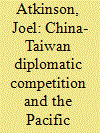

|
|
|
|
|
| Publication |
2010.
|
| Summary/Abstract |
China and Taiwan have become important actors in South Pacific affairs due to their diplomatic rivalry. Securing the diplomatic recognition of the Pacific Islands countries is expensive for China and Taiwan. There are limits to what the rivals are willing to spend, and they attempt to reduce costs. This dynamic shapes how Taiwan and China engage Pacific Islands politicians. It also motivates their high level official visits to the region, and how they engage South Pacific regional organizations. Despite criticisms that China-Taiwan rivalry corrupts and destabilizes the South Pacific, the issue of whether China and Taiwan's diplomatic rivalry has been beneficial or detrimental to the region remains contentious. China and Taiwan appear to have recently called a truce in their decades-old rivalry. This tacit agreement is still tentative, and the involvement of China and Taiwan in the region has yet to change significantly. However, Taiwan has reportedly begun to reduce funding, and is likely to reform its aid delivery in order to satisfy demands from the South Pacific region's dominant power, Australia, and to improve its image as a humanitarian aid donor. China is also likely to reduce funding while the truce holds. However, China considers its ties with South Pacific governments more important than responding to Australian pressure, and is unlikely to reform its South Pacific aid programmes as a result of the diplomatic truce.
|
|
|
|
|
|
|
|
|
|
|
|
|
|
|
|
| 13 |
ID:
107931
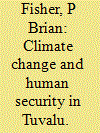

|
|
|
|
|
| Publication |
2011.
|
| Summary/Abstract |
At the local level, global climate change is exacerbating current environmental conditions while creating entirely new environmental and human hazards. The thesis of this article is that these new threats merge with preexisting vulnerabilities, creating a hybridized force that ripples through every aspect of society and threatens human security. The vulnerabilities intensify as these communities lack the adaptive and developmental capacity to address the multifarious effects, further undermining their human security. This article examines the case of the Funafuti, Tuvalu, and the effect of a warming Southern Pacific Ocean on Tuvaluan societal structural flows and processes. As the case demonstrates, climate change becomes more than an environmental issue; rather, it is a global social problem bound by multiple human security issues. For extremely vulnerable countries like Tuvalu, the case suggests that a human security approach best captures the dynamics of climate impacts in vulnerable communities, and, as such, requires adjustments in the global climate regime's current approach. This conclusion also represents a challenge to current scholarship which suggests that the small islands will be uninhabitable simply from sea level rise.
|
|
|
|
|
|
|
|
|
|
|
|
|
|
|
|
| 14 |
ID:
181944
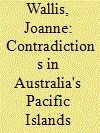

|
|
|
|
|
| Summary/Abstract |
The Australian government demonstrates strategic anxiety about the ‘crowded and complex’ geopolitics of the Pacific Islands region. This reflects its broader concerns about geostrategic competition in the ‘Indo-Pacific’, and its perception that Pacific states are ‘small’ and ‘weak’ and therefore vulnerable to influence from potentially hostile powers. Simultaneously, the government has vowed to ‘step-up’ its engagement with its ‘Pacific family’, emphasising that its relationships with Pacific states will be characterised by respect for, and listening to them, as equals. But while the government has articulated its intention to improve its relationships with Pacific states, puzzlingly, it adopts policies that undermine this goal. This article analyses how and why this occurs. It outlines what this analysis demonstrates about how leaders and officials perceive the Pacific, what assumptions and habits inform those beliefs, and as the ‘step-up’ moves from announcement to implementation, how they are translated into behaviour via government policy. It concludes by arguing that Australian leaders and officials should seek consistency in their discourse about, and policies toward, the Pacific, guided by the discourse of the ‘Blue Pacific’.
|
|
|
|
|
|
|
|
|
|
|
|
|
|
|
|
| 15 |
ID:
146480
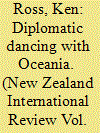

|
|
|
| 16 |
ID:
189246
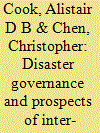

|
|
|
|
|
| Summary/Abstract |
The Southwest Pacific is considered one of the most vulnerable regions in the world to natural hazards. Five of the Pacific Island States (PIS) rank among the top 20 most-at risk countries in the World Risk Index, with Vanuatu and Tonga ranking first and second respectively. The Southwest Pacific neighbours Southeast Asia and both regions are exposed to a variety of natural hazards, resulting in significant damage and loss of lives annually. Similar exposure to climate-induced hazards raises the potential to create a coalition of affected states from the Asia-Pacific to share knowledge of disaster governance in areas where niche capabilities have been developed and shape the global debate on the effects of natural hazards and climate-induced disasters. This article argues that inter-regional partnership on disaster governance is the next step in the Asia-Pacific to respond to a collective action problem affecting two sub-regions - Southeast Asia and the Southwest Pacific. Through the conduct of desk research and interviews, this article first presents findings and observations on the disaster governance landscape and future developments in the Pacific. It then discusses disaster management frameworks and initiatives that ASEAN has institutionalised, and how work in the two sub-regions can complement one another and provide a platform to help shape the global agenda on disaster governance and climate change.
|
|
|
|
|
|
|
|
|
|
|
|
|
|
|
|
| 17 |
ID:
171912
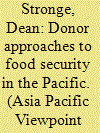

|
|
|
|
|
| Summary/Abstract |
As part of the 2030 Agenda for Sustainable Development, sustainable development goal 2 (SDG2) specifically seeks to ‘End hunger, achieve food security and improved nutrition and promote sustainable agriculture’. However, there is no clear prescription for how this goal should be achieved which allows various donors adopting diverse strategies to all claim they are contributing to SDG2. This article examines whether policies of five donors on food security and agriculture in the Pacific Islands region are likely to help to achieve SDG2. Fundamentally, the current and future wellbeing of many Pacific Island peoples, many of whom live on small, geographically dispersed islands with limited market access, is strongly tied to their abilities to produce food for themselves. This is somewhat overlooked by bilateral donors from Australia and New Zealand who invest relatively small amounts in the agriculture sector of Pacific countries and show little interest in supporting people's food security through local sourcing and production for subsistence. From an SDG2 perspective of ending hunger for all people, it is positive to see that, by contrast, two multilaterals have shown commitment to a more balanced and holistic approach to food production in the Pacific Islands region.
|
|
|
|
|
|
|
|
|
|
|
|
|
|
|
|
| 18 |
ID:
149844


|
|
|
|
|
| Summary/Abstract |
Small Island Developing States (SIDS) have established ambitious renewable energy targets. The promotion of renewable energy has been motivated by several factors: a desire to lessen dependence on fossil fuels, to attract development assistance in the energy sector, and to strengthen the position of SIDS in climate change negotiations. Here we explore the interplay between the role of aid and energy policy in the development of renewable energy resources in SIDS. We find that the importance of development assistance has implications for the sustainability of renewable energy development, given that funding is not always accompanied by necessary energy policy reforms. We also identify energy efficiency and access to modern energy services as having received insufficient attention in the establishment and structure of renewable energy targets in SIDS, and argue that this is problematic due to the strong economic case for such investments.
|
|
|
|
|
|
|
|
|
|
|
|
|
|
|
|
| 19 |
ID:
185167
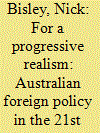

|
|
|
|
|
| Summary/Abstract |
What ideas and concepts might be used to reinvigorate a progressive approach to Australian foreign policy? In contrast to the clarity of the international vision provided by right-wing movements, there is uncertainty about the contours of a progressive approach to contemporary Australian foreign policy. This article outlines the basis of a ‘progressive realism’ that can challenge right-wing accounts. Progressive realism combines a ‘realistic’ diagnosis of the key dynamics that underpin contemporary world politics with a ‘progressive’ focus on the redistribution of existing power configurations. Taken together, these two building blocks provide the foundations for a left-of-centre foreign policy agenda. We apply progressive realism to four policy areas: pandemic politics, aid and infrastructure in the Pacific, climate change, and a crisis in the Taiwan Strait. This analysis, in turn, highlights the challenges and opportunities for progressive political actors in crafting foreign policy both within and beyond Australia.
|
|
|
|
|
|
|
|
|
|
|
|
|
|
|
|
| 20 |
ID:
187472
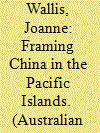

|
|
|
|
|
| Summary/Abstract |
How did many Australians come to accept that competition, rather than cooperation, with China was necessary in the Pacific Islands? We use discourse analysis techniques to examine the role that framings in Australian official discourse, media, and commentary over the last decade (2011–2021) played in constructing China’s presence in the region as threatening such that many Australians have accepted that policies aimed at competing with China are the most reasonable foreign and strategic policy response. We find that Australian official discourse was characterised by qualified optimism about China’s role until 2018, when a more explicit emphasis on competition emerged. Echoing this shift, while the media and (much of) the commentary framed China’s role in terms of threat and competition throughout the decade, this framing increased significantly in 2018. It is impossible to isolate the Australian government’s policy approach to China in the Pacific Islands from its broader understanding of China’s increasingly activist role in Australia, the Indo-Pacific, and globally. But our findings suggest that, by consistently framing China in terms of threat and competition, the media and – to a lesser extent, commentary – created an enabling environment for the public to accept changes to the Australian government’s policies.
|
|
|
|
|
|
|
|
|
|
|
|
|
|
|
|
|
|
|
|
|